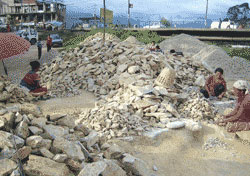Being the first budget after Jana Andolan II, the upcoming budget has special importance and it must respond to the aspirations of the people.
It must address the plight of the rural people who have suffered the brunt of the conflict. It must be inclusive and support the peace process. Noble as they are, all those goals cannot possibly be met by this budget. The real importance of this budget lies elsewhere: it is about establishing the credibility of the state.
The political transition in April has brought Nepal a rare opportunity in history, an 'open moment'. The enormous popular energy that was mobilised against the old order also lifted many social and political constraints that the people used to accept as given. The Nepali people now feel a new future is within their grasp.
It is also a very fluid moment. Along with great opportunities, it presents serious risks. The huge energy mobilised in April, if not given a direction, can easily tear the country in different directions. Already there are such signs.
|
|
| BY THE WAYSIDE: Women break stones all day at a gravel depot at Balaju on Tuesday. How will next week's budget improve their lives? |
The rising demands, from organised labour in private factories and the civil service to even universities, may benefit narrow interests of small groups in the short-run, but they will surely not help put Nepal on a sustainable path of growth and prosperity. If these demands are all accommodated, Nepal would find itself in an even more difficult quagmire of patronage politics and weak global competitiveness.
To direct this energy away from self interests to a collective purpose, there must be a vision that can captivate the people's imagination. The vision must be complemented with a sequence of actions to sustain the momentum and the people's belief that the country is indeed moving towards a better future. This requires leadership and that is the role of the state.
Unfortunately, the state in Nepal has been by and large an instrument for the privileged. Even under multiparty democracy, annual budgets tended to promise many things that seemed politically expedient and failed to deliver most of them. This was a perfect way to undermine the confidence of the people in the state. This must change.
But Nepal also starts with considerable assets to build on. Five decades of development efforts have demonstrated that the real strength of Nepal lies at the community level. Many successful community-based programs, from forestry management and rural drinking water schemes to school management, give overwhelming evidence on this matter.
It is obvious that the new concept of the state must be based on a partnership between the communities, or the people, and the state. By creating the space for the community and providing it with some resources, the state can facilitate far greater development impact than it has ever been able to by itself. Partnership should also extend to the genuine private sector (as opposed to 'crony capitalism').
Nepal must act quickly and forcefully if it is to seize this open moment and realise the dream of a New Nepal. The most important step the budget can take, then, is to begin redefining the state and its relationship with the people. That is what this budget should be about.
It will take some time for Nepalis, the state and the people together, to define a clear vision of the New Nepal. But, its outline is already visible. It must be focused on three things: peace, social and political inclusiveness, and economic growth.
The kind of state that must emerge to make this vision possible is also clear enough. This budget can begin to take the first steps toward effective implementation by building real partnerships with communities. It is almost immaterial to which specific programs the new budget will allocate its resources, as long as they meet some significant needs. It is, however, absolutely essential that what is promised is delivered.
Those simple actions will go a long way toward constructing a credible state that can facilitate inclusive development in Nepal. If the people feel that such a state is being built, which will eventually meet other pressing needs of the country, they will be willing to wait.
On the other hand, if this budget fails to convince the people that an important beginning is being made, there is little for which to wait. The importance of this budget goes far beyond a normal budget. It is about the credibility of the state, and by extension the fate of New Nepal.
Ken Ohashi is the World Bank Country Director for Nepal




